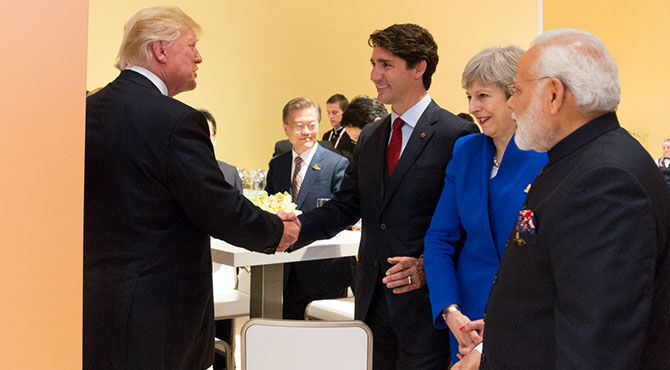UK-Canada to “use CETA as basis for Brexit trade deal”
Canadian PM Justin Trudeau and British PM Theresa May present a united face about the Bombardier/Boeing dispute, as the two leaders discussed post-Brexit trade negotiations and CETA.

Official White House Photo by Shealah Craighead. President Donald J. Trump, Prime Minister Justin Trudeau, Prime Minister Theresa May, and Prime Minister Narendra Modi | July 7, 2017
Post-Brexit UK/Canada deal would be based on CETA
After talks with Prime Minister Theresa May in Ottawa, Mr Trudeau said a future deal with the UK would be based on the EU-Canada Comprehensive Economic and Trade Agreement (CETA), which comes into provisional effect on Thursday and which will eventually remove 97 per cent of customs duties between the two sides.With the UK being Canada's largest trading partner in Europe, Mr Trudeau spoke at a joint press conference of the importance of “stability and continuity” in the two nations’ economic relationship post-Brexit.Although Britain cannot reach any trade deals until it has actually left the EU, the two premiers agreed to establish a joint working party immediately to prepare the ground for a future deal based on CETA, which took seven years to negotiate and for which the UK has been a prime mover.Mrs May said, “I’m pleased that we have agreed today that CETA should be swiftly transitioned to form a new bilateral arrangement between the UK and Canada. We want to ensure that when we leave the European Union, for businesses and people, that change is as smooth and orderly as possible."And working on CETA as becoming the first of the bilateral trade relationships between the UK and Canada means that seamless transition can take place. People will know the basis on which that trading relationship will be set up."We will be having a working group, which obviously will be looking at the details of how that transition will operate in detail."Related stories:
- CETA finally signed and sealed – but not yet delivered
- Canadian businesses call for change to NAFTA rules for travellers
- Deutsche Bank warns of post-Brexit labour 'shock'
Mr Trudeau said he wanted to see “a smooth transition that keeps the essence of CETA applicable to the UK”. He added, "We want to see as little disruption to economies and to people’s lives and that is why we believe it makes sense to take (CETA), which the UK is a part of, as the basis for a bilateral relationship with the UK."
Boeing and Bombardier: Trudeau and May present a united front
The two leaders also adopted a united front over the legal action being taken by Boeing against the Canadian aircraft-maker Bombardier, which has a plant employing 4,200 people in Belfast. US trade authorities are expected to rule next week on Boeing's claims that subsidies from the Canadian and UK governments have allowed Bombardier to dump its C-Series jets on the US market.Mrs May has already raised her concerns about the possible effect of the ruling on jobs in Northern Ireland in a phone call with President Trump and said she will address the issue again when the pair meet in New York this week."I will be impressing on him the significance of Bombardier to the United Kingdom and particularly to jobs in Northern Ireland," Mrs May said, adding that she and Mr Trudeau had discussed "how we can work together and to see a resolution of this resolution which, from my point of view, I want to see a resolution that protects those jobs in Northern Ireland".Canada ready to drop plans to buy Boeing's Super Hornet fighter jets
For his part, Mr Trudeau said Canada would drop plans to buy Boeing’s Super Hornet fighter jets unless the Seattle-based company withdrew its case against Bombardier."We have obviously been looking at the Super Hornet aircraft from Boeing as a potential significant procurement of our new fighter jets. But we won’t do business with a company that is busy trying to sue us and put our aerospace workers out of business," he said.©2026 Re:locate magazine, published by Profile Locations, Spray Hill, Hastings Road, Lamberhurst, Kent TN3 8JB. All rights reserved. This publication (or any part thereof) may not be reproduced in any form without the prior written permission of Profile Locations. Profile Locations accepts no liability for the accuracy of the contents or any opinions expressed herein.






























